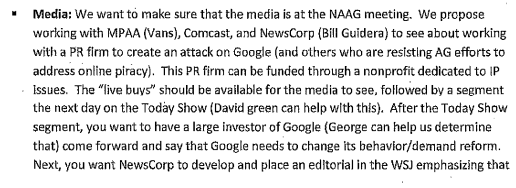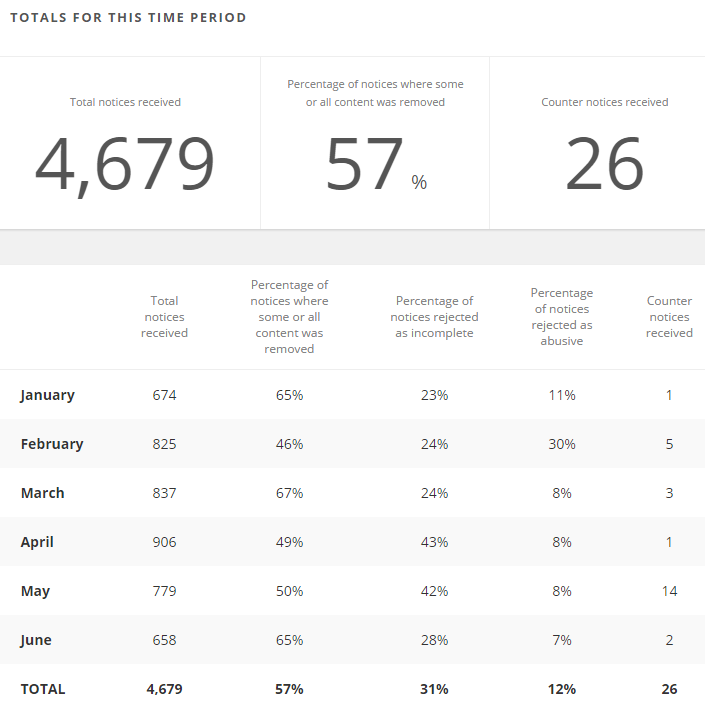MPAA Emails Expose Dirty Media Attack Against Google
lundi 27 juillet 2015 à 11:59 Late last year leaked documents revealed that the MPAA helped Mississippi Attorney General (AG) Jim Hood to revive SOPA-like censorship efforts in the United States.
Late last year leaked documents revealed that the MPAA helped Mississippi Attorney General (AG) Jim Hood to revive SOPA-like censorship efforts in the United States.
In a retaliatory move Google sued the Attorney General, hoping to find out more about the secret plan. The company also demanded copies of internal communications from the MPAA which are now revealing how far the anti-Google camp planned to go.
Emails between the MPAA and two of AG Hood’s top lawyers include a proposal that outlines how the parties could attack Google. In particular, they aim to smear Google through an advanced PR campaign involving high-profile news outlets such as The Today Show and The Wall Street Journal.
With help from Comcast and News Corp, they planned to hire a PR firm to “attack” Google and others who resisted the planned anti-piracy efforts. To hide links to the MPAA and the AG’s office, this firm should be hired through a seemingly unaffiliated nonprofit organization, the emails suggest.
“This PR firm can be funded through a nonprofit dedicated to IP issues. The ‘live buys’ should be available for the media to see, followed by a segment the next day on the Today Show (David green can help with this),” the plan reads (pdf).
The Today Show feature would be followed up by a statement from a large Google investor calling on the company to do more to tackle the piracy problem.
“After the Today Show segment, you want to have a large investor of Google (George can help us determine that) come forward and say that Google needs to change its behavior/demand reform.”
In addition, a planted piece in the Wall Street Journal should suggest that Google’s stock would lose value if the company doesn’t give in to the demands.
“Next, you want NewsCorp to develop and place an editorial in the WSJ emphasizing that Google’s stock will lose value in the face of a sustained attack by AGs and noting some of the possible causes of action we have developed,” the plan notes.

Previously, the MPAA accused Google of waging an “ongoing public relations war,” but the above shows that the Hollywood group is no different.
On top of the PR-campaign the plan also reveals details on how the parties would taint Google before the National Association of Attorneys General.
Through a series of live taped segments they would show how easy it is for minors to pirate R-rated movies, buy heroin and order an assault weapon with the help of Google’s search engine.
Finally, the plan includes a “final step” where Attorney General Hood would issue a civil investigatory demand to Google.
In its court filing (pdf) Google uses the information above to argue that the AG’s civil investigatory demand was not the basis of a legitimate investigation. Instead, it was another tool pressuring the company to implement more stringent anti-piracy measures.
Given this new information, Google hopes that the court will compel Fox, NBC and Viacom to hand over relevant internal documents, as they were “plainly privy” to the secretive campaign.
It’s now up to the judge to decide how to proceed, but based on the emails above, the MPAA and the AG’s office have some explaining to do.
Source: TorrentFreak, for the latest info on copyright, file-sharing, torrent sites and the best VPN services.
 This week we have two newcomers in our chart. Furious 7 came out as a DVDrip and made a comeback.
This week we have two newcomers in our chart. Furious 7 came out as a DVDrip and made a comeback. Automattic, the company behind the popular
Automattic, the company behind the popular 
 Due to complex licensing agreements between content creators and distributors, movies and TV shows are often locked down to a specific region. A prime example is the U.S. edition of Netflix which offers a better selection than versions available elsewhere.
Due to complex licensing agreements between content creators and distributors, movies and TV shows are often locked down to a specific region. A prime example is the U.S. edition of Netflix which offers a better selection than versions available elsewhere. “I don’t want to cause any harm to Sky and I even asked them for a regular subscription some time ago, but they refused to sell one to Germany. So they have to live with the consequences of attracting the interest of high-tech freaks to the technical details of their access control system.”
“I don’t want to cause any harm to Sky and I even asked them for a regular subscription some time ago, but they refused to sell one to Germany. So they have to live with the consequences of attracting the interest of high-tech freaks to the technical details of their access control system.” Unauthorized movie streaming sites have been a thorn in the side of Hollywood for many years, and yesterday the MPAA decided to take one of the most prominent players to court.
Unauthorized movie streaming sites have been a thorn in the side of Hollywood for many years, and yesterday the MPAA decided to take one of the most prominent players to court.